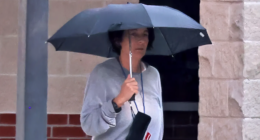Share this @internewscast.com

Global warming could be fueling growing rates of cancer in women, a shock study suggests.
Scientists in Egypt examined the incidence of breast, cervical, ovarian, and uterine cancers across 17 Middle Eastern nations, correlating them with climate change over time.
Their study determined that each one-degree Celsius (1.8 degrees Fahrenheit) rise in temperature corresponded to a surge in cases of the four types of cancer by as much as 280 per 100,000 individuals in the past two decades.
The most significant increase was observed in ovarian cancer cases, rising by 280 per 100,000 people, while the smallest increase was noted in breast cancer cases, at 173 per 100,000 people.
Deaths from all four cancers on average also rose by 171 to 332 deaths per 100,000 for each degree of temperature rise. The greatest rise in deaths was in ovarian cancer at 332 per 100,000, and the smallest was in cervical cancer at 171 per 100,000.
The experts from the American University in Cairo note their study was observational and does not prove causation. But they believe global warming could increase exposure to carcinogens, such as those created by wildfire pollution.
Extreme weather events such as wildfires and hurricanes, can also disrupt necessary screenings and cancer treatments, causing an increase in cases and deaths.
Women are also thought to be more prone to these health effects from climate change, especially during pregnancy and menopause.
Dr Wafa Abuelkheir Mataria, first study author and researcher at the American University in Cairo, said: ‘As temperatures rise, cancer mortality among women also rises — particularly for ovarian and breast cancers.
‘Although the increases per degree of temperature rise are modest, their cumulative public health impact is substantial.’
Though the research only looked at countries in the Middle East and North Africa, the US and UK have also been struck by climate change and surging rates of some female cancers.
Breast cancer, which strikes 330,000 US women every year, has increased one percent every year since 2012, according to the American Cancer Society.
Uterine or endometrial cancer rates have also increased about 0.6 percent per year from 2010 to 2019. The disease affects 69,000 US women and kills 14,000 every year.
Ovarian and cervical cancers, however, have decreased by up to two percent per year over the last decade, largely due to increased use of birth control and better access to the human papillomavirus (HPV) vaccine.
In the UK, one woman is diagnosed with breast cancer every 10 minutes, adding up to 55,000 per year.
Over 12,000 women lost their lives to breast cancer to the disease in 2022, and figures show it is set to hit more than 17,000 by the half century, the World Health Organisation (WHO) said.
Ovarian cancer affects 7,500 women in the UK and kills 4,300, and uterine cancer affects 10,000 and kills 2,500. And each year 3,300 Brits are struck by cervical cancer and 850 lose their lives.
The findings also come after President Donald Trump axed 1,000 climate scientists from the Environmental Protection Agency (EPA), following a history of dismissing climate change as a hoax.
The study, published Tuesday in the journal Frontiers in Public Health, collected data on cases and deaths from breast, cervical, ovarian and uterine cancers for 17 countries in the Middle East and North Africa.
Nations included in the study were Algeria, Bahrain, Egypt, Iran, Iraq, Jordan, Kuwait, Lebanon, Libya, Morocco, Oman, Qatar, Saudi Arabia, Syria, Tunisia, United Arab Emirates and Palestine.
The team then compared cancer data to changing temperatures in each country. All data collected, from online United Nations databases, represented 1998 through 2019.
For every one degree Celsius of temperature change, cases of the four cancers increased by between 173 and 280 additional cancers per 100,000 people.
Ovarian cancer had the biggest increase at 280 additional cancers, while breast had the smallest at 173.
Cancer deaths overall increased by 171 to 332 deaths per 100,000 for each degree of temperature rise. The greatest rise in deaths was in ovarian cancer, and the smallest was in cervical cancer.
Cancer prevalence and deaths increased alongside temperatures in six countries: Qatar, Bahrain, Jordan, Saudi Arabia, the United Arab Emirates and Syria.
Breast cancer increased by 330 cases per 100,000 people in Bahrain, 560 in Qatar and 440 in the UAE. Deaths from breast cancer rose 420 per 100,000 in Jordan, 550 per 100,000 in Qatar, 310 per 100,000 in Saudi Arabia and 350 per 100,000 in UAE for each degree of Celsius.
Ovarian cancer prevalence increased in Bahrain, Jordan, Qatar, Saudi Arabia and UAE by 390, 460, 540 and 290 per 100,000 people, respectively, as temperatures rose.
Deaths from ovarian cancer in those four countries rose between 330 and 480 per 100,000.
Cervical cancer increased in Bahrain, Qatar and Syria by 380, 510 and 250 cases per 100,000, respectively. Deaths from the disease increased by 330 per 100,000 in Iran, 450 per 100,000 in Jordan and 610 per 100,000 in Qatar.
For uterine cancer, prevalence increased in Jordan, Qatar, Saudi Arabia and the UAE by 480 per 100,000, 620 per 100,000, 360 per 100,000 and 370 per 100,000, respectively.
Deaths from uterine cancer rose in Jordan and Qatar by 440 and 430 per 100,000.
Dr Sungsoo Chun, study co-author and associate chair of the Institute of Global Health and Human Ecology at the American University in Cairo, said: ‘Temperature rise likely acts through multiple pathways. It increases exposure to known carcinogens, disrupts healthcare delivery, and may even influence biological processes at the cellular level.
‘Together, these mechanisms could elevate cancer risk over time.’
He also noted women are ‘physiologically more vulnerable to climate-related health risks, particularly during pregnancy.’
‘This is compounded by inequalities that limit access to healthcare. Marginalized women face a multiplied risk because they are more exposed to environmental hazards and less able to access early screening and treatment services,’ he added.
Dr Mataria cautioned the study ‘cannot establish direct causality,’ and there could be other factors in individual countries influencing cancer rates in women.
She said: ‘Nonetheless, the consistent associations observed across multiple countries and cancer types provide compelling grounds for further investigation.’
The team called for stronger cancer screening programs in areas particularly prone to climate change, as well as reducing exposure to environmental carcinogens.
Dr Chun said: ‘Without addressing these underlying vulnerabilities, the cancer burden linked to climate change will continue to grow.’




